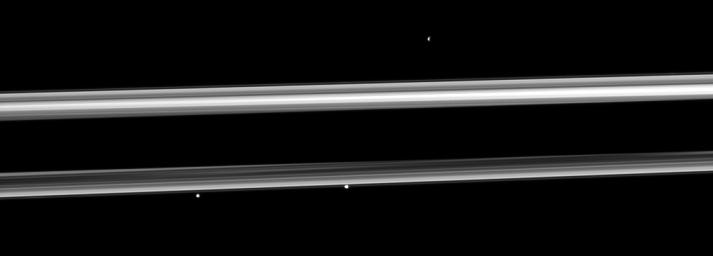
|
Tiny Trio
- Click the image above for a larger view
- Full-Res JPEG (1016 x 365) (17.6 kB)
- Full-Res TIFF (1016 x 365) (371.4 kB)
Caption:
Three of Saturn's small moons straddle the rings in this image. From left to right are Pandora, Prometheus and, near the top right, Epimetheus.
Pandora (81 kilometers, or 50 miles across) and Prometheus (86 kilometers, or 53 miles across) are closest to Cassini. Epimetheus (113 kilometers, or 70 miles across) is on the far side of the rings.
This view looks toward the northern, sunlit side of the rings from just above the ringplane. The shadow of Saturn is cast upon the rings, darkening the middle of the image from left to right.
The image was taken in visible light with the Cassini spacecraft narrow-angle camera on Nov. 27, 2009. The view was acquired at a distance of approximately 2.4 million kilometers (1.5 million miles) from Epimetheus and 2.2 million kilometers (1.4 million miles) from Prometheus and Pandora. Image scale is 14 kilometers (9 miles) per pixel on Epimetheus and 13 kilometers (8 miles) per pixel on Prometheus and Pandora.
Background Info:
The Cassini-Huygens mission is a cooperative project of NASA, the European Space Agency and the Italian Space Agency. The Jet Propulsion Laboratory, a division of the California Institute of Technology in Pasadena, manages the mission for NASA's Science Mission Directorate, Washington, D.C. The Cassini orbiter and its two onboard cameras were designed, developed and assembled at JPL. The imaging operations center is based at the Space Science Institute in Boulder, Colo.
For more information about the Cassini-Huygens mission visit http://saturn.jpl.nasa.gov/ . The Cassini imaging team homepage is at http://ciclops.org .
Cataloging Keywords:
| Name | Value | Additional Values |
|---|---|---|
| Target | Saturn Rings | Epimetheus, Pandora, Prometheus, Saturn |
| System | Saturn | |
| Target Type | Ring | Planet, Satellite |
| Mission | Cassini-Huygens | |
| Instrument Host | Cassini Orbiter | |
| Host Type | Orbiter | |
| Instrument | Imaging Science Subsystem (ISS) | |
| Detector | Narrow Angle Camera | |
| Extra Keywords | Grayscale, Shadow, Visual | |
| Acquisition Date | ||
| Release Date | 2010-03-11 | |
| Date in Caption | 2009-11-27 | |
| Image Credit | NASA/JPL/Space Science Institute | |
| Source | photojournal.jpl.nasa.gov/catalog/PIA12587 | |
| Identifier | PIA12587 | |
